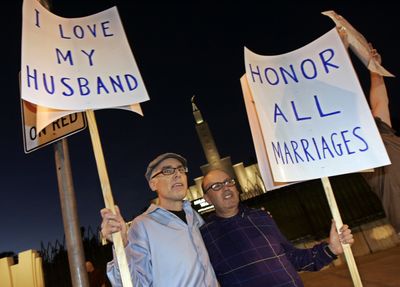Gay marriage advocates target Mormon church
California vote spurs protests across country, including Spokane

Supporters of gay marriage, frustrated over a ballot-box defeat in California, have channeled much of their anger toward the towering white spires of Mormon temples.
Since last week’s passage of Proposition 8, which was strongly backed by the Mormon church, demonstrations have been held at temples from California to Manhattan.
There were chants of “Mormon scum” and slurs against church founder Joseph Smith in Los Angeles, and a church meeting-house was vandalized.
Gay marriage advocates plan more protests nationwide this weekend, some outside the U.S. Capitol and at statehouses and city halls across the country, including Spokane City Hall today at 10:30 a.m.
A handful of people held a peaceful vigil Wednesday night outside the Mormon temple in Spokane Valley.
“We were fine with them being here,” Greg Mott, stake president of the Spokane East Stake of the Church of Jesus Christ of Latter-day Saints, said afterward.
But in a statement issued before the event, Mott said: “It is disturbing that our church or any other group would be singled out for speaking up, voting, and being part of the democratic process.”
The backlash has ignited a debate over whether the church deserves to be singled out for what opponents believe was a dishonest campaign, or simply is an easy political target as a minority religion that has already taken plenty of lumps.
The Mormon church’s Proposition 8 efforts represent its strongest push into politics since it opposed the Equal Right Amendment in the 1970s.
Heterosexual marriage is central to Mormon theology; Mormons believe their marriages are keys to eternal life.
The church has sought to portray itself as just one member of a coalition of Catholics, evangelicals, black Protestants and others that supported Proposition 8, a constitutional amendment which bans gay marrage in California after the state Supreme Court had allowed it.
But opponents of the measure point to extensive Mormon organizing and the staggering amount of money donated by individual Mormons at the behest of church leaders in Salt Lake City.
Proposition 8 opponents say Mormon money funded irresponsible ads, like one suggesting young children would be required to learn about homosexuality in schools.
“The part that saddens me is that money donated by people of faith was used to finance advertising that is as close to blatant lies as you can get,” said Lindi Ramsden, a Unitarian minister who organized interfaith opposition to the measure.
Even so, Ramsden sent an e-mail to allies this week warning against making scapegoats of any one group, including Mormons and blacks, who also strongly backed the measure.
Dale Carpenter, a University of Minnesota law professor who opposed Proposition 8, agrees that said singling out the Mormon church is wrong.
“It’s especially inappropriate to target the physical buildings – the places of worship themselves – because that invites the kind of religious intolerance we have suffered too much of in the history of this country,” Carpenter said.
Gay rights activists also have proposed tourism boycotts in Utah and challenges to the church’s tax-exempt status.
One factor in Mormons becoming an opposition target was Mormonsfor8.com, a Web site founded by Nadine Hansen, a 61-year-old semiretired lawyer from Cedar City, Utah, who says she is a Mormon but does not attend church.
Because the church itself did not donate money to the campaign, Hansen sought to identify Mormon donors of $1,000 or more, matching campaign records to tips from site visitors and church members and what she and others uncovered with search engines.
The site attributes $15 million in donations to Mormons, or nearly half the Yes on 8 war chest in a state where Mormons make up 2 percent of the population.
“Basically, if the church wants to know why Mormon sacred places are targeted, look in the mirror,” Hansen said.
Some Mormon scholars believe more is at work than anger against Mormons flexing financial and organizational muscle.
Armand Mauss, a retired Washington State University sociologist, said the campaign laid bare a “latent anti-Mormon undercurrent.”
Anti-Mormon rhetoric is politically safe because Mormons remain a relatively small minority and “have never been completely assimilated as ‘normal Americans’ to completely live down the image of ‘weirdness’ inherited from the 19th century,” Mauss said in an e-mail.
The evangelical mantra that Mormons aren’t Christian – as well as this year’s raid in Texas of a polygamist sect, a group not always distinguished from mainstream Mormonism – feeds into that, he said.